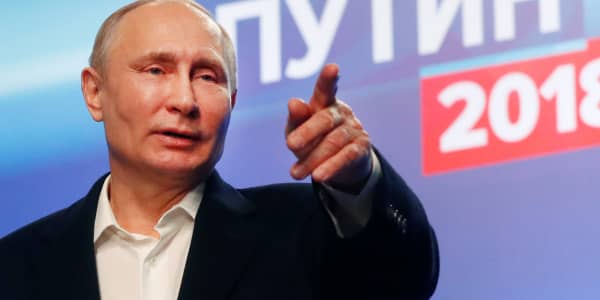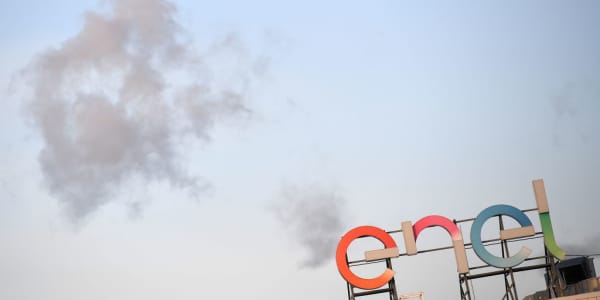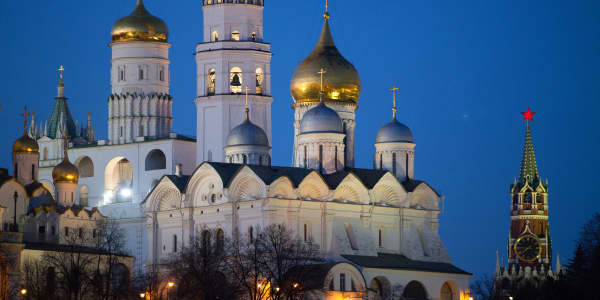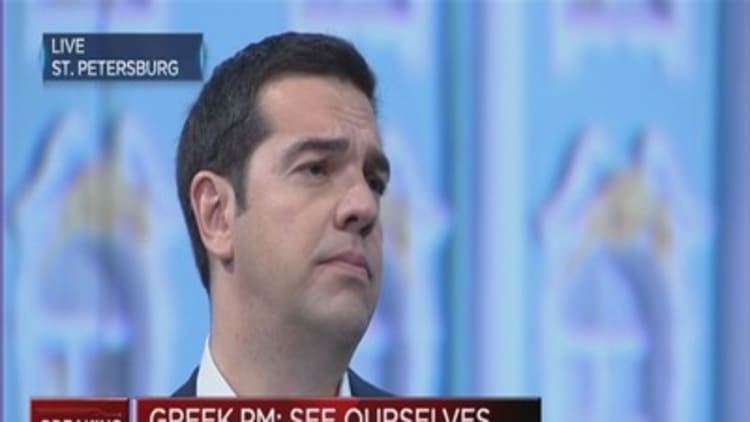
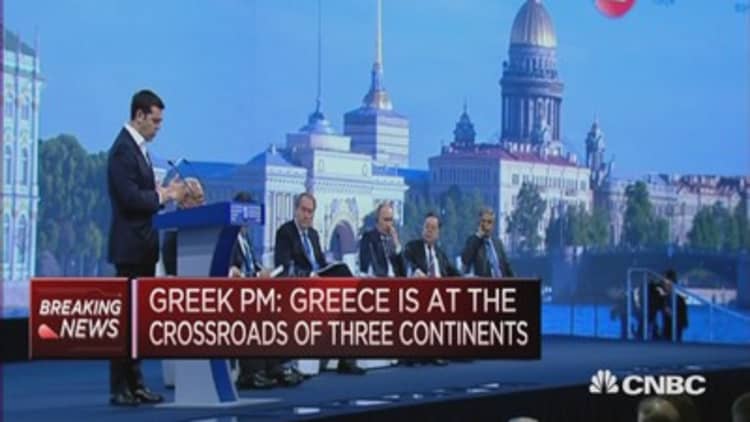
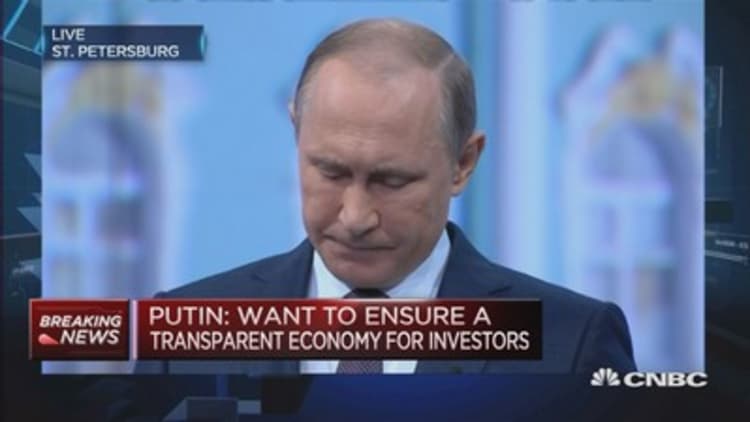
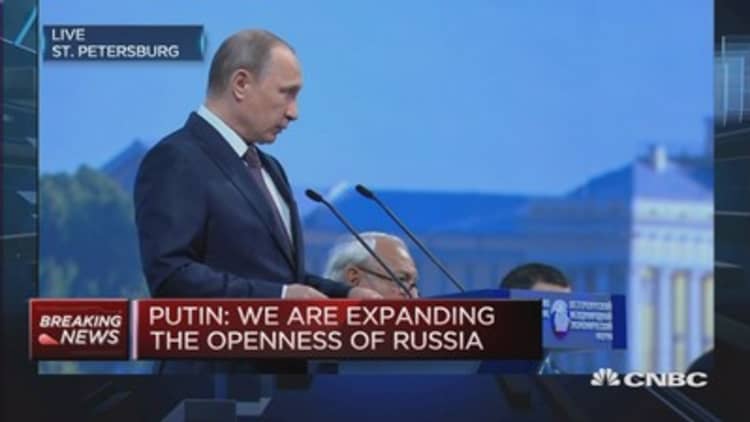
Greek Prime Minister Alexis Tsipras highlighted the importance of his country's relationship with Russia as he shared the stage with President Vladimir Putin at a key economic summit in St. Petersburg Friday.
While recriminations flew between Greece and its international creditors over much-needed rescue funds, Tsipras declared at a session at the St. Petersburg International Economic Forum that "Russia is one of the most important partners for us," adding that the indebted country could no longer "carry the burdens of the past".
"The so-called problem of Greece, is a whole problem of the European Union," Tsipras said as he hinted that the traditional economic centers "of the planet" were shifting.
"We are at the moment at the center of a storm, a whirlpool. But we live near the sea, so we are not afraid of storm," he said, alluding to the economic debt crisis Greece faced and the unresolved bailout talks taking place with European lenders.
Tsipras also suggested that Greece must look for "seas that offer a safer port in a storm" as he urged Europe to side with solidarity rather than "dead-end" austerity.
With Greece's relations with its European counterparts at a low ebb as a default on its debt repayment looms, Tsipras headed to Russia on Thursday to meet Putin. The visit comes at a , with reforms-for-rescue talks between the country and its international lenders in deadlock.
The European Central Bank (ECB) raised Friday the funding cap on its Emergency Liquidity Assistance (ELA) for Greece's banks, as a specter of a run on Greek banks is looming.
Tsipras' government has already warned it will not have the money to pay a debt of 1.5 billion euros to the International Monetary Fund (IMF) without an agreement, prompting increasing concern that Greece will default and eventually leave the euro zone.
Rumors have swirled this week that Greece, in the absence of a deal with its Western creditors, may have looked to Russia for financial aid.
However on Thursday, Russian Deputy Finance Minister, Sergei Storchak, said Greece had not asked the Russian Finance Ministry for financial assistance, Dow Jones reported. The ministry would not comment on the remarks when contacted by CNBC.
Read MoreCalm before storm? Stocks rally as Greece in crisis
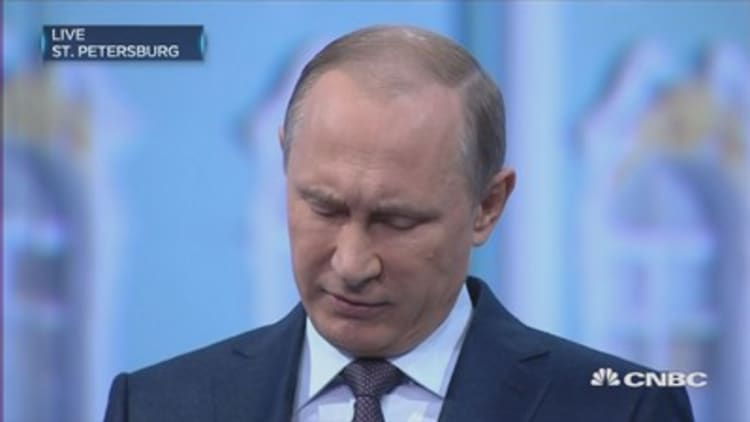
Speaking on Russia's economic position, President Vladimir Putin has said that despite the international sanctions imposed last year, the country has developed an "inner strength" and has managed to replace its imports domestically, which has help fend off and economic crisis.
Putin said that while many-market watchers predicted "deep crisis" for Russia, "this has not happened", he said, speaking from SPIEF on Friday, as inflation and the Russian ruble has managed to regain stability.
EU member states agreed earlier this week to extend economic sanctions against Russia by six months over the Ukraine conflict. Current sanctions expire at the end of July and foreign ministers are expected to sign off on the extension next week.
International sanctions were first imposed against Russia in July of last year in response to Russia's annexation of the Ukraine region of Crimea and its support for pro-Russian separatists. Following international trade sanctions, which resulted in restricted Russian access to foreign capital from the West, Russia initiated an embargo on European and U.S. foods.
Moscow's food embargo banned dairy products, vegetables and meats from the EU, U.S. and other countries.
Putin said the sanctions had "boosted" Russia's work in "import replacement", particularly in food products such as butter, cheese, fish and meat.
"We respond to external restrictions by expanding our freedom and raising the openness of Russia," Putin said.
While trade agreements with Asia Pacific, the Far East, Latin America and BRICs countries were becoming increasingly important, Putin also emphasized that Russia would not lessen its efforts in working with its "traditional Western partners"
"Russia is open to the world, we are open," he added.
CNBC's Holly Ellyatt contributed to this report.



